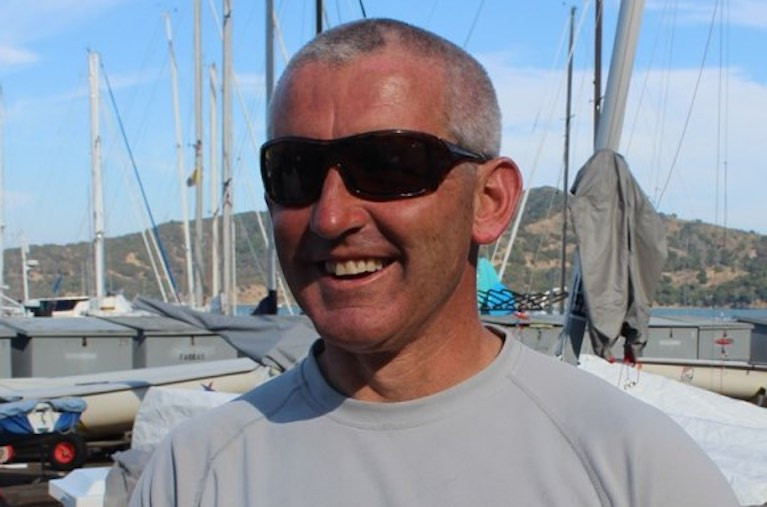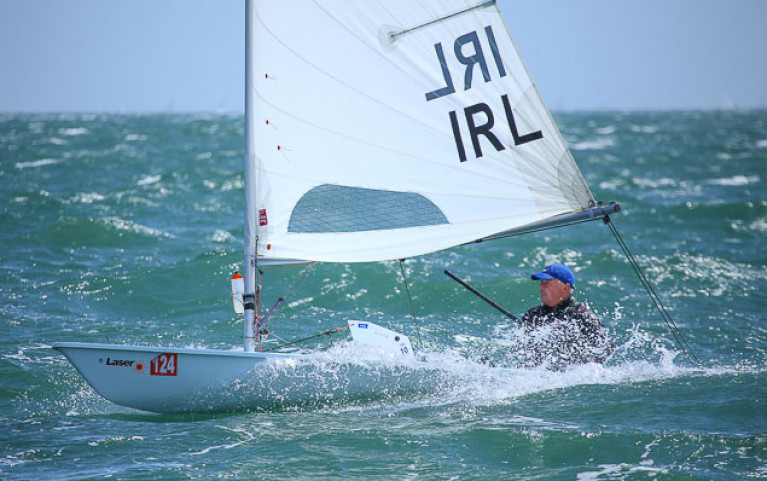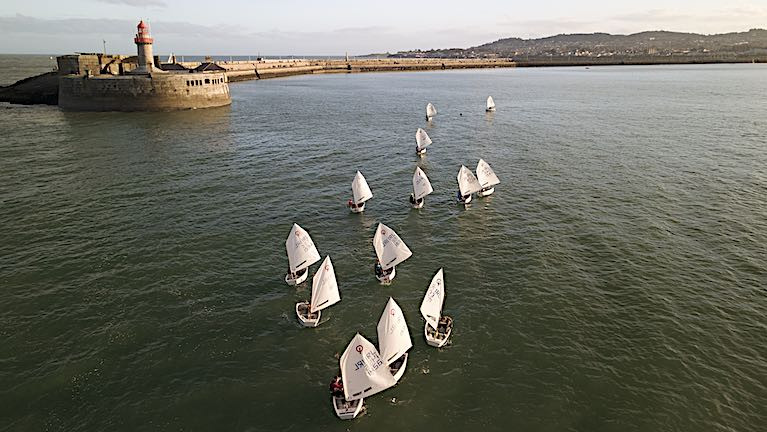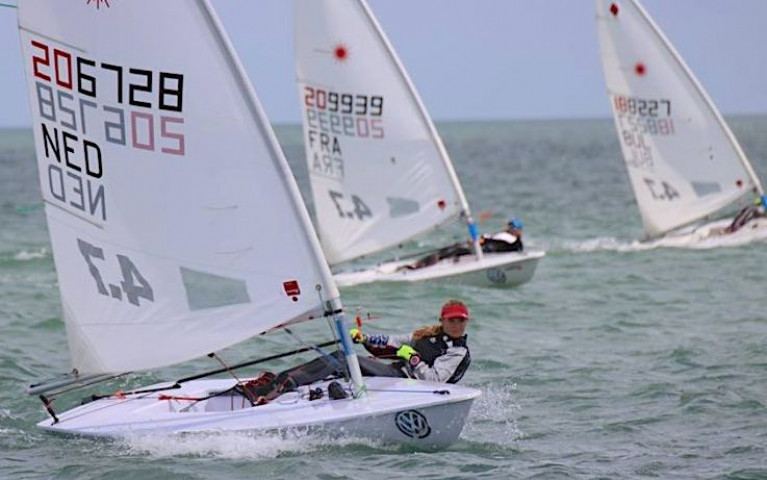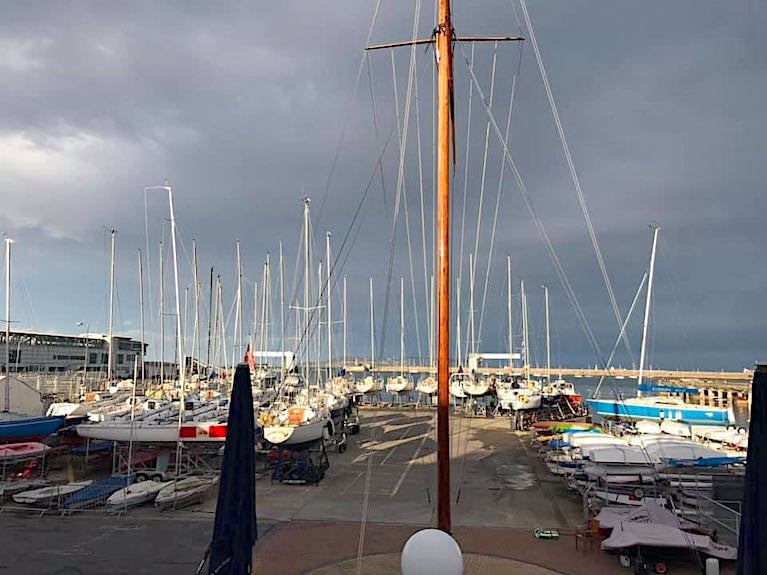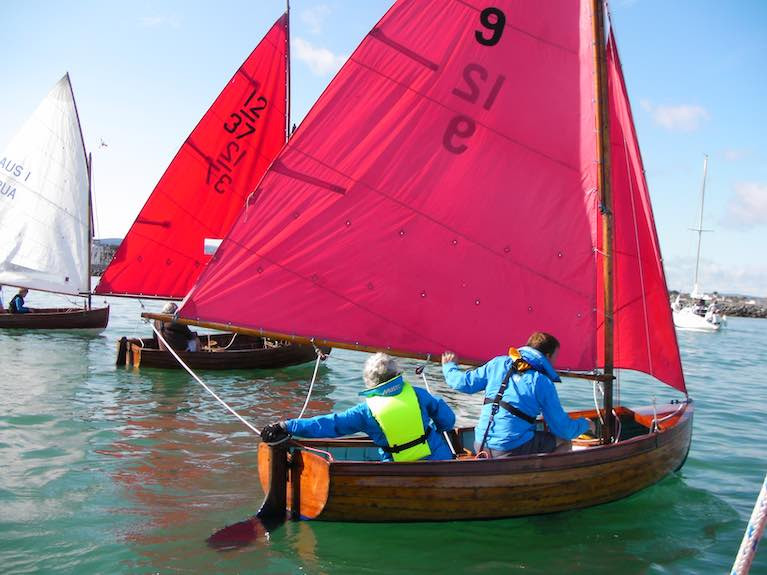Displaying items by tag: Royal St George Yacht Club
Royal St George Yacht Club Inaugural Laser 'Kindergarten' Series Proves a Friday Evening Success (Video)
The inaugural Kindergarten Laser Race Series was run for the Dun Laoghaire Harbour 'Kindergarten' fleet by the Royal St George Yacht Club over three Friday evening in June.
Attracting a total entry of 13 boats the fleet largely is comprised of beginner/improving sailors looking to learn more about sailing and improve their skills.
There were six races in total for the two desperate rigs (full and radial) on triangular courses inside the harbour. Safety and comfort were paramount with no racing attempted in wind over 15kts.
As Afloat reported in February, the whole idea was to give less experienced dinghy sailors a fun but competitive environment. The sailors also received some on-course coaching from some of the clubs 4.7 and Radial sailors who were in the patrol boats on the water.
 The RSTGYC Laser 'Kindergarten'
The RSTGYC Laser 'Kindergarten'
They also received really valuable feedback from the race management team which included Sean Craig, newly crowned Irish Radial Masters Champion, Judy O'Beirne newly crowned Irish Ladies Radial Champion and Shirley Gilmore one of Ireland's most successful Masters sailors in recent years.
Laser Kindergarten Series at Royal St. George Yacht Club
 Laser Kindergarten Series at Royal St. George Yacht Club
Laser Kindergarten Series at Royal St. George Yacht Club
The video (below) by Darina Loakman also shows the competitors had a great dinner after the event where the Kindergaten groups driving force Rachel Crowley thanked all the competitors, helpers, organisers and club staff.
Also pictured is Commodore Richard O'Connor maintaining social distancing requirements with everyone except his wife Lorraine who finished in third place behind David Bolger and Heather Craig in the Radial while George Misstear won the full rig fleet.
The Royal St George Yacht Club have agreed to hold the Irish 12 Foot Championships in 2021. In a remarkable development, The Bray Droleen 12 Foot Class will join the International 12 Foot Dinghies and their sisters the Dublin Bay 12 Foot Dinghies for the first time.
For the Bray Droleens, this will be their first-ever Irish Championships, and the first time they have sailed in Dun Laoghaire since it changed its name from Kingstown.
From 1897, Droleens used to be regular attendees at the Kingstown Township Regatta (The predecessor of today's Volvo Dun Laoghaire Regatta), and sailed up from Bray across beautiful Killiney Bay in order to compete. Several new Bray Droleens have been built since the year 2000, (many of which were featured on this website) and are now located around the country, including those in Counties Donegal, Galway, Dublin and at the home port of Bray, Co. Wicklow.
 International 12 Foot Dinghies (above) and (below) their sisters the Dublin Bay 12 Foot Dinghies (same hull shape but with mainsail and jib)
International 12 Foot Dinghies (above) and (below) their sisters the Dublin Bay 12 Foot Dinghies (same hull shape but with mainsail and jib)

For the International 12 Foot Dinghies and their sisters the Dublin Bay 12 Foot Dinghies (same hull shape but with mainsail and jib) they have been holding their annual Irish Championships at the Royal St George Yacht Club since 2011.
With all three classes sharing an overall length of 12 feet (3.65m.) and a sail area of about 100sq.ft (9.29m2) all should have a similar performance and will race together as a single fleet. It will be interesting to compare their speeds, and in particular, it will be interesting to see if it is an advantage to the Droleens to fly their spinnakers (the only one of the three classes to permit the use of a spinnaker).
The event takes place on Sunday, 29 August 2021 at the Royal St George Yacht Club, Dun Laoghaire
Anybody interested in finding out about this event or 12 Foot Dinghies should contact [email protected] or [email protected] for more information.
Following the AGM at the Royal St. George Yacht Club in Dun Laoghaire Harbour earlier this week, a new team of flag-officers led by Commodore Richard O’Connor is preparing for a busy season once Covid restrictions are eased.
Like many sporting bodies, the Dun Laoghaire club has faced a potentially severe impact due to the pandemic but there were also signs for optimism reported as well.
The club has managed to sustain its 1,500-strong membership base and the virtual AGM held via Zoom heard that a combination of loyalty by members and staff alike have left the club in a stable position and ready for the 2021 season.
In addition to the new Commodore, Mark Hennessy was elected Vice-Commodore, Kate Fogarty as Rear Commodore (Sailing) and Derek Ryan continues as Rear-Commodore (Social). Robbie Walker and Brian D’Arcy were also appointed to the club’s operational board.

Tributes to Outgoing Commodore Peter Bowring
Paying tribute to outgoing Commodore Peter Bowring, Richard O'Connor said: "Peter Bowring has brought our club through, especially turbulent times to a point of resilience. Covid has seen people rediscover Dublin Bay's potential for leisure and interest in membership of our club is up, thanks to Peter's guidance and efforts to keep Sailing and watersports our priority."
Depending on final guidance from Government and Irish Sailing, the club has prepared plans to resume training, coaching and racing activities and anticipates Junior sailing courses for the Summer in accordance with guidelines.
The club will also relaunch its outdoor Bar & Catering services when permitted and looks forward to resuming its full range of social 'clubs within a club' later in the year when pandemic counter-measures are eventually eased.
There was a turnout of 181 sailors for Royal St George Yacht Club's North Sails 'Winning Races' In Dublin Bay' last Wednesday.
As Afloat reported previously, The top tips session by North Sails' Maurice O'Connell was co-hosted by the Dun Laoghaire club's rear commodore, Mark Hennessy.
It was a successful evening, full of inside information about competing and winning on the capital's waters.
The night was very educational with speed tips (see video below) and there was plenty of humour thrown in, not only from Prof and Mark Hennessey but also from the audience who were able to ask questions and comments via an online chat box.
We understand during these difficult times how important interaction with others is, we feel as a club this is a great way to have that safely. We at the RSGYC look forward to welcoming Prof in the future and thank him again.
The club looks forward to welcoming future speakers over the coming weeks to its online webinars.
Royal St George Yacht Club Presents a 'Winning Races In Dublin Bay' with North Sails & Prof O'Connell
The Royal St George Yacht Club in Dun Laoghaire Harbour presents a 'Winning Races In Dublin Bay'; a Top Tips From North Sails Ireland’s Maurice O'Connell on Wednesday, February 24th.
“Prof” from North Sails Ireland never misses a DBSC race with his customers unless he is out of the country. Over the years he has raced in hundreds of DBSC races in everything from the biggest IRC cruiser 0 yachts, to the smaller one-designs. He has put together his “10 Top Tips for Racing in Dublin Bay” which he will share with RSGYC members.
Join the “Prof” on Wednesday, February 24th at 19:30 on Zoom for an engaging talk based on racing, and most importantly, winning in Dublin Bay.
Click here to register for this event
The Royal St. George Yacht Club Laser dinghy fleet hit the headlines at the weekend as the class also prepares to release a new video to promote solo sailing at Dun Laoghaire Harbour.
2020 was a record season for the Dublin Bay Laser Class, and by all accounts, they’re expecting an even bigger season in 2021.
While continuous sailing has been difficult for all fleets since the start of the pandemic, the single-handed Laser fleet has fared better than most, and as a result, its popularity has surged.
As Afloat reported previously, for the 2020 Dublin Bay Sailing Club (DBSC) summer series, the Laser had the highest number of entries compared with any other fleet, with over 90 boats registered. Entries were split across the Standard, Radial and 4.7 rigs with both adult and junior sailors taking part.
Now the fleet, under class captain Brendan Hughes, is on the promotional trail with a new Royal St. George YC video for the class ready expected for release shortly.
80 Laser sailors are involved at the RStYGYC, according to Hughes, where all year round sailing is on offer. Club boats are also available to rent.
The video also features interviews with youth sailors Alannah Coakley, Oisin Hughes and the junior class captain at the club, Robbie Walker.
Meanwhile, Irish Times video journalist Enda O'Dowd featured the class prominently at the weekend in a feature around sailing during Covid here but we're not entirely sure how memberships of sailing clubs have "almost doubled" over the last year as claimed but of the rise and rise of the Laser, there is no doubt.
Dun Laoghaire Optimist Group 'DOGs' Prepare Youth Sailors for Irish Trials at Royal St. George Yacht Club
Former Optimist dinghy champion Peter Fagan is coaching the 'Dun Laoghaire Optimist Group' (DOGs) for May's Irish trials hosted by the Royal St George Yacht Club and here Fagan outlines how he aims to prepare the sailors for the demands of competing at the Dublin Bay Trials
The Dun Laoghaire Optimist Group is a training collaboration between the waterfront clubs in Dun Laoghaire providing a high-performance programme for sailors with the annual Optimist Trials being the core goal. The programme has five experienced coaches, Clare Gorman, Nicola Ferguson, Sarah Fogarty, Tom Higgins and myself. We currently have 27 sailors in the programme split into four groups ranging from 10-15 years old. Unfortunately, due to the increase in Covid-19 restrictions, the programme has been put on hold until further ease in restrictions.
Having been given the opportunity to be the head coach for the 'DOGs', I was eager to pass on the knowledge that I gained from competitive sailing both in the Optimist and Laser class to the next generation of sailors. Now that the Royal St George Yacht Club, my home club and where I previously won the Optimist Trials back in 2014, has been announced as the host for the 2021 Trials, I am definitely very excited! I have no doubt that the Royal St. George will put on a fantastic event for the sailors. Dun Laoghaire always offers a true test of a sailor's skills, with conditions ranging from shifty westerly winds with choppy waves or an easterly with consistent breeze and swell.
 Dun Laoghaire Optimist Group in training before lockdown Photo: Peter Fagan
Dun Laoghaire Optimist Group in training before lockdown Photo: Peter Fagan
The Optimist Trials is the most unique event of the calendar due to two main factors.
Firstly, the event traditionally has 13 scheduled races over the course of 5 days with only two discards in the series. This setup rewards the sailor who sails consistently and has a 'never give up' attitude. This year, however, there is a change to the event's usual setup where the number of days racing has been reduced to three, running over the course of the May bank-holiday weekend.
Secondly, sailors aren't just competing for silverware but a chance to qualify for a team to represent Ireland on an international stage such as the Optimist World and European Championships. This gives the event that added bit of pressure and a sailor that can stay composed over the event will have a great advantage to the rest of the fleet.
The Dun Laoghaire Optimist programme aims to prepare the sailor for the demands of competing at Trials. The programme is broken into multiple training blocks ranging from boat handling skills to practising racing situations. We recently had a talk from Finn Lynch who shared his experience with the sailors of what constitutes a successful mindset during a competition. Most importantly, having fun is fundamental to the programme where we've had paddle races and Christmas celebrations.
Operating under Covid-19 restrictions was challenging and forced us to adapt the programme by switching a lot of learning to online. We began to use Google Classroom for posting recaps and videos from training sessions, Google Forms to survey the sailor's performance at each session and lastly, Zoom calls for debriefs online at the end of each days sailing.
The programme wouldn't have been able to run successfully without the help of the programme organisers, parent volunteers, coach Pieter Van Den Bossche and the guidance of Ronan Adams, sailing manager at the Royal St George Yacht Club. I am certainly looking forward to coaching over the season ahead where fingers crossed competition will be re-introduced after a year of its near absence.
 Unfortunately, due to the increase in Covid-19 restrictions, the DOGs programme has been put on hold until further ease in restrictions. Photo: Paddy Madigan
Unfortunately, due to the increase in Covid-19 restrictions, the DOGs programme has been put on hold until further ease in restrictions. Photo: Paddy Madigan
Royal St George & National Yacht Clubs' Laser 4.7 Youth Worlds 2021 Battle on Despite Post-Pandemic Uncertainties
At one stage last Autumn, it looked for a week or two as though Irish venues might be hosting no less than five World Championships for dinghy classes during the three week period between the July 24th and August 14th 2021. But since then, as the only certainty in this rolling pandemic has proven to be uncertainty itself, two events have been shunted on into 2022.
However, the biggest 2021 Worlds of all in Ireland - the Laser 4.7 Youth Worlds at the Royal St George YC and the National Yacht Club from 7th to August 14th – has this week confirmed that the Organising Committee chaired by Ian Simington is pressing on with planning in the assumption that the event is going to take place. Entries will open at the end of the first week of February.
Being a typical Laser mega-event, most entries will be invitation-only on a national qualification basis. But as these regattas are planned on the expectation of accommodating between 300 and 400 boats, there's a good chance that extra places will be available for keen young Irish sailors determined to take part if at all possible, and the word is that already there's no lack of names wishing to be considered.
 Laser 4.7s enjoying the kind of weather and racing that is planned for Dublin Bay in August…
Laser 4.7s enjoying the kind of weather and racing that is planned for Dublin Bay in August…
In an event of this stature and magnitude, the behind-the-scenes work is almost immeasurable, with the fact of it being in Ireland providing unique difficulties in the countdown period. While we go along with enthusiasm in support of the view that Ireland is a small island at the centre of the world, there's no doubt that in trying to see our way towards and through the post-pandemic revival of international sailing events here, our glorious island status poses extra problems.
For sure, major offshore racing events avoid many of these through the simple fact that the boats get here on their own, and if needs be can take part – provided they're certified and scrutineered - without any direct inter-personal shoreside contact whatever. However, with the more popular dinghy classes, not only is there the need for cross-channel ferry access and subsequent road-trailering to the venue, but there's the usual attractive element of it being a family venture, with two or even three family-campaigned boats being supported by a veritable tribe of related supporters, who see the big championship as the focus of a family holiday.
This is one of the reasons why two dinghy World Championships planned for Ireland in 2020 – for the GP14s and the Fireballs - were cancelled so promptly. The feeling among the class associations was that if it couldn't be a lovely big community party in addition to being a white-hot sailing competition, then it really wasn't worth thinking about 2020 at all, and the best thing was to start planning towards 2021 immediately.
 Mirror Championship at Sligo, venue for the Worlds in August 2021
Mirror Championship at Sligo, venue for the Worlds in August 2021
Thus there was a crazy if brief period back in the Autumn when the most extreme optimists were thinking that Ireland might be hosting no less than five World Championships in 2021. In terms of boat numbers, the biggest – long since set in the calendar - was almost inevitably going to be these Laser 4.7 Youth Worlds at the Royal St George YC and National YC in Dun Laoghaire, and equally long term was the Mirror Worlds at Sligo from August 2nd to 8th.
But then with the GP14 Worlds 2020 at Skerries dropped for 2020's shutdown yet with 2021 still held out as probable, and with the same approach for the Fireball Worlds 2020 at Howth, we'd the possible 2021 Worlds listings up to five, as in June 2020 the Toppers had booked in their big one for the Royal Cork Yacht Club from July 24th to 30th 2021.
The family holiday nature of these five major events was emphasised by their timing right in the middle of the main holiday season, for with the GPs and Fireballs talking in terms of late July and early August, we were going to get a hectic mosaic of World Championships starting with the Toppers in Cork and the GP14s at Skerries around July 24th, and concluding with the last Laser 4.7 races at RStGYC in Dublin Bay on August 14th.
If this off-the-wall "Five Worlds in Three Weeks" scenario had come to pass, one could imagine that personnel resources of qualified race officials might have been severely stretched. But it very quickly did indeed prove to be off-the-wall, as the GP 14 International Association continued to monitor the pandemic situation, and then in tandem with the Irish Association and Skerries Sailing Club, they moved their entire circus on another year to 2022. As for the Fireball Association, they have now decided to skip 2021 as they had to skip 2020, and their next worlds in 2022 will be in Australia at Geelong from 7th to February 18th, which is – when you think of it – simply a slight extension of 2021 by other means.
 Toppers in action on Belfast Lough. If their 2021 programme goes according to plan, they'll be holding the Worlds at Crosshaven in late July, followed a few days later by the UK Open Nationals at Ballyholme.
Toppers in action on Belfast Lough. If their 2021 programme goes according to plan, they'll be holding the Worlds at Crosshaven in late July, followed a few days later by the UK Open Nationals at Ballyholme.
Meanwhile, the Toppers are hoping to shape up with an all-Ireland caravanserai, as their Worlds at Crosshaven will be closely succeeded by the UK Nationals at Ballyholme. We can only guess at what the logistical permutations might be like in getting across what is now an EU border in a hopefully post-pandemic situation. But meanwhile, across in Dun Laoghaire, the big Laser event will be emerging rock-like from seas which - for many of us - are at the moment decidedly confused.
Certainly, there's quite head of steam building up, as the 2020 Laser 4.7 Worlds at Arco on Lake Garda, having initially been postponed, were ultimately cancelled, so as a form indicator we have to go back to Canada in 2019, and the huge Laser regatta at Kingston, Ontario.
That was when the main Irish impact was in the Laser Radials, with Eve McMahon taking the Bronze, but in the Laser 4.7s it was either the Mediterranean or Eastern Europe setting the pace, with Niccolo Nordera from Italy winning from Roko Stepanovic of Croatia, with Slovenia's Gasper Strahnovik getting third, while the Girls Fleet was won by Anja von Allmen from Switzerland, with Lara Himmes of Spain second and Sara Savelli of Italy third.
As we lost the 2020 Irish Laser Championship in August's short season through storm conditions, the most recent Laser 4.7 results we have in Ireland are from 2019, when Cillian Foster of Royal Cork won the class in the Irish Youth Pathway Nationals from Alana Coakley of Royal St George, with Emily Riordan (RStGYC) third, and two National YC helms - Hugh O'Connor and Conor Gorman - in fourth and fifth.
 Front of house….this is the façade which the 1838-founded Royal St George YC presents to the town of Dun Laoghaire
Front of house….this is the façade which the 1838-founded Royal St George YC presents to the town of Dun Laoghaire
 …..but the real action is "round the back", with RStGYC hosting a Laser event with their National Yacht Club neighbours (below)
…..but the real action is "round the back", with RStGYC hosting a Laser event with their National Yacht Club neighbours (below)

For young sailors, 2019 is now aeons ago, so the anticipation levels for this August regatta are running at a stratospheric level. For a man at the eye of the storm, Ian Simington remains remarkably calm. But then, in addition to being a Laser sailor himself as well as campaigning a J/80, he has wide experience of event organisation including four years at the sharp end of Optimist organisation, which is not a place for the faint-hearted.
However, as it was with the 301-boat Laser Masters Worlds in Dun Laoghaire in September 2018, the huge administrative challenge ashore and afloat is being undertaken in full partnership with the National Yacht Club. In fact, with boat numbers this size, it becomes a true Dun Laoghaire Harbour communal effort in order to keep everything on track, with Ian Simington heading a central committee which in turn will be supported by several specialist sub-groups.
 At the heart of it – Ian Simington brings extensive experience to his role as Chairman of the Organising Committee for the Laser 4.7 Youth Worlds 2021.
At the heart of it – Ian Simington brings extensive experience to his role as Chairman of the Organising Committee for the Laser 4.7 Youth Worlds 2021.
And in addition to the calming effect of his wide experience, he knows that the strong Irish club tradition will provide a host of volunteers ready for any useful role which can help to keep this vitally important World Championship running smoothly to remind us that no matter what size of a sail you put on a Laser, it still looks like – and is - a great boat
 The Laser Lineup – still a world-beating set of options after more than fifty years
The Laser Lineup – still a world-beating set of options after more than fifty years
The Royal St George Yacht Club at Dun Laoghaire Harbour completed its winter lift-out of sailing cruisers on Saturday (October 24), some 4 months and 17 days since the boats were lifted in for the heavily delayed COVID season.
The traditional lift-out was completed in calm conditions even though early forecasts predicted otherwise.
Last night the club posted a message on social media to thank all those involved. "A big thank you to all who helped out on the big day for the Club. Thank you to all boat owners and their crews and to all of the Lift team and the weather gods who shone on us today"
While the bulk of the RStGYC fleet is now hauled out and ashore on the club's hard standing some club boats are still afloat at the marina awaiting news of the postponed DBSC Turkey Shoot where the hope is that there may still be some pre-Christmas racing after Level 5 COVID restrictions are lifted.
In its note to members the RSTGYC also said, "We now turn to winter sailing under Level 5, at the very least we will ensure that as restrictions and guidelines permit we will get afloat. Winter sailors and their boats will be welcomed back on Friday."
The DMYC lift out of boats on the town's west pier was also completed on Saturday.
Having originally scheduled Saturday for its lift out, The East Pier based National Yacht Club lift now takes place today.
Varian & Johnson Win Royal St. George Yacht Club Hosted 10th Anniversary of Revived Irish 12-Foot Championship
The Royal St George Yacht Club in Dun Laoghaire hosted the 2020 Irish 12 Foot Dinghy Championships on 13th September with two alternative rigs permissible, the International 12 Foot Dinghy rig with a single sail and the Dublin Bay Sailing Club rig which permits the same sail area to be distributed between the mainsail and jib. This alternative rig was devised in the 1960s to address the steep waves of Dublin Bay.
The weather forecast seemed to suggest 8 knots of wind from the southwest with gusts of up to 18 knots. The 12 Foot Dinghy Association and OOD communicated with the competitors on the evening before the event asking them to bring reefing equipment with them, so that the event could proceed even if the weather was unkindly. The day dawned with a blue sky and a 2-4 knot wind with occasional gusts of 12 knots.
Race one started with a northeasterly wind and just after the start, it shifted to the north-west. Gavan Johnson in 'Albany' was quick to adapt to the new wind and after a shortened course signal reduced the race to one lap of the course, he won the race from young Andrew Miller in 'Pixie.'
 The fleet led by Ian Magowan in 'Sgadan'
The fleet led by Ian Magowan in 'Sgadan'
By race two, the wind had shifted to the south-west, but once again shifted to the south-east as Ian Magowan in 'Sgadan' led from 'Albany.' It was quite a battle between these two but 'Albany' had the speed and tactics to lead over the finish line.
The third race started in a delightful 6 knots of breeze from the northeast but just before the dinghies reached the windward mark the wind disappeared and the race was abandoned.
All sailed or paddled ashore for a hearty brunch with a nice pint of Guinness with the hope of better wind in the afternoon. Since all the wet Pubs throughout the country are closed- it is delightful to enjoy a pint with your brunch.
 David and Henry Shackleton in 'Scythian'
David and Henry Shackleton in 'Scythian'
In the afternoon the wind was initially from the south-west. Halfway up the beat the wind died and came back from the northeast. With one of the turning marks close to the marina breakwater, 'Cora' lost her momentum and when it looked like she could drift onto the rocky breakwater, crew Ruairi Shanahan pulled out an oar to push them off. Due to this illegal propulsion, they retired from this race which was again won by 'Albany.'
In the final race, the wind was back in the northeast, and Vincent Delany took the helm of 'Cora,' but he couldn't touch 'Albany' for speed in the prevailing conditions.
Gail Varian and son-in-law Gavan Johnson won the historic Edmond Johnston Trophy and the Altair Trophy for the crew of the winning boat and Andrew Miller and Iseult Costello who shared the steering of 'Pixie' won the historic Cora Trophy.
 Andrew Miller winner of the Irish International 12 Foot Dinghy Championship in 'Pixie'
Andrew Miller winner of the Irish International 12 Foot Dinghy Championship in 'Pixie'
Download final results below as an Xcel file.
Next year the 12-foot dinghies move to Lough Ree Yacht Club for their Irish championship.



























